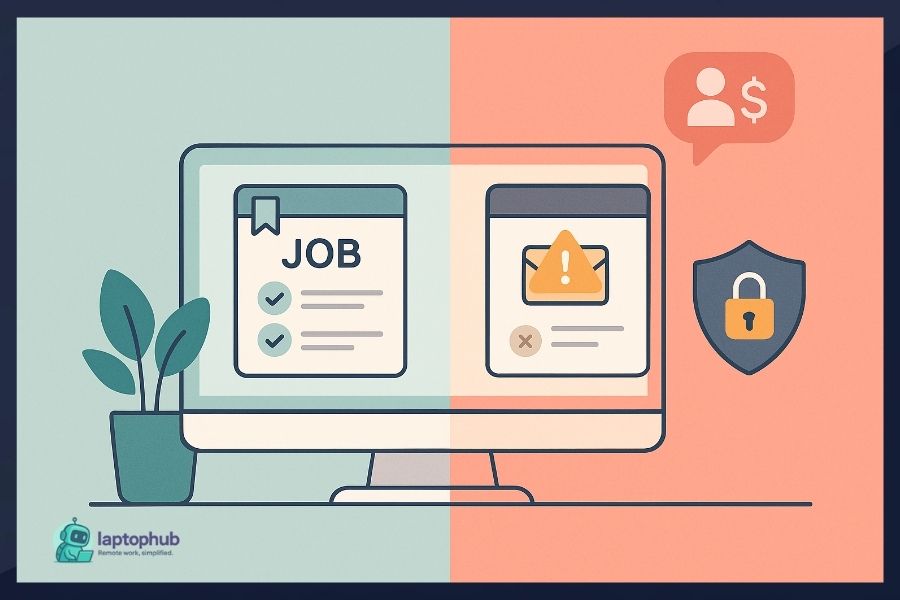Remote work promises flexibility, freedom, and control over your time, but not every opportunity is what it seems. As more people search for online jobs, scammers are stepping in with job offers that look professional and even generous, yet end in financial loss or identity theft. The danger isn’t always obvious. Sometimes the emails look real. The job listings seem credible. But one wrong click, one too-trusting reply, and you could be giving away your bank details, personal documents, or worse. Knowing how to spot common remote work scams and how to avoid them isn’t just smart, it’s necessary.
💡Key takeaways:
- Scammers are exploiting the surge in remote job seekers by creating realistic but fake opportunities.
- Common tactics include fake job offers, check scams, identity theft, and phishing emails.
- Red flags include requests for money upfront, urgency without details, off-platform communication, and unverified contacts.
- Remote workers can protect themselves through research, secure communication, and using verified platforms.
Working remotely has become the norm for millions, but it has also become a goldmine for scammers. As more jobs move online, so do fraudsters, eager to exploit job seekers who are hoping to land flexible, location-free work.
The setup usually sounds perfect: competitive pay, flexible hours, and the ability to work from anywhere. But behind that pitch is a growing web of remote job scams. These range from fake listings to identity theft, and the people behind them know exactly how to make things look convincing.
Whether you are applying for your first remote position or you already have experience as a freelancer, this guide breaks down the most common types of remote work scams and how to avoid falling for them.
The rise in remote work has opened the door to more scams
Remote work exploded during the pandemic, and for many, it has remained the preferred way to earn a living. However, the same tools that make remote work possible also make it easy for scammers to impersonate companies, fabricate job offers, and disappear without a trace.
Here are the top reasons remote job scams are so common:
- The number of job seekers looking for remote roles is huge, and growing.
- Most scams are easy to set up and hard to track.
- New applicants often lack experience with online job platforms.
- Many people are eager for flexible work and overlook red flags.
Scammers know this. They study legitimate listings and mimic them closely, right down to the company name and job title.
Fake job listings are the most widespread remote scam
Scammers create fake job ads that look nearly identical to real ones. These listings often appear on popular sites like LinkedIn, Indeed, or Facebook Jobs. Sometimes, they even claim to be from recognizable companies.
Once you apply, the scammer contacts you quickly, usually via email or chat. There is no real interview process. Instead, they may ask for personal information or even offer you the job right away. Then comes the request for banking details or money to cover equipment, training, or onboarding costs.
Red flags to watch for:
- Communication happens entirely through chat or messaging apps like Telegram.
- The interviewer uses a Gmail, Yahoo, or similar generic email address.
- You are offered the job quickly without a proper interview.
- You are asked to pay for training, gear, or anything upfront.
How to protect yourself:
- Research the company. Go to their official website to see if the job is posted there.
- Look up the recruiter on LinkedIn to confirm they work at the company.
- Never share your personal or banking details early in the process.
- Be cautious with roles that sound too good to be true or are overly vague.
Overpayment and check-cashing scams can leave you in debt
In this type of scam, the fraudster sends you a check, usually under the pretense of paying for work-related equipment or prepayment. Then they ask you to forward a portion of that money to someone else—such as a vendor or contractor.
The check appears to clear at first, but later bounces. You are left responsible for the full amount while the scammer disappears.
Common signs of this scam:
- You are told to deposit a check and send some of it elsewhere.
- They insist on urgency and pressure you to act quickly.
- There is no formal contract or written explanation of expenses.
- Payment is offered before any real work begins.
What you should do instead:
- Refuse to forward or transfer funds you have not earned.
- Wait until a check fully clears, which can take 7 to 14 days.
- Use platforms with built-in payment protections like Upwork or Fiverr.
Fraudulent freelance clients often target beginners
If you are a freelancer using online platforms, you might come across a client who wants to take the conversation off-site. They may say it’s more convenient or that they can pay more if you use direct payment.
Once you are off the platform, protections are gone. These clients may ask for unpaid work samples or send you tasks without ever intending to pay.
Red flags from fake clients:
- They refuse to use the platform’s contract or messaging system.
- They offer vague project details and avoid answering questions.
- They insist you use Telegram, WhatsApp, or email instead.
- They ask for unpaid “test tasks” that resemble real work.
Safer habits to build:
- Keep communication on the freelance platform until the first job is complete.
- Avoid giving away full work without payment or contracts.
- Use watermarks or partial files when submitting samples.
- Verify that the client’s payment method is active and funded.
Upfront payment requirements are often a scam tactic
One of the oldest tricks in the book is requiring new hires to pay for training, equipment, or software access. These scams target people who are eager to start working and may not know that legitimate employers never charge to get started.
You are told that the fee will be reimbursed after a probation period, but after you pay, the contact vanishes.
How to recognize this kind of scam:
- The employer asks for money before sending you a formal offer.
- The training program is vague and has no reviews or proof.
- There is no refund policy in writing.
- The “company” cannot be found through basic research.
Smart steps to take:
- Ask for a signed contract before sending any money.
- Look up the company on Glassdoor, Reddit, or job forums.
- Check if the website was recently created using WHOIS tools.
- Never pay to apply, interview, or onboard for a job.
Phishing emails are getting better at looking legitimate
Some scams arrive in the form of emails that appear to come from well-known employers like Amazon or Google. These messages include links that take you to fake websites designed to steal login credentials, financial details, or even install malware on your device.
🖥️Also read: How to Spot Phishing Emails as a Remote Worker
Clues that an email is fake:
- The sender’s address does not match the company’s official domain.
- There are spelling or formatting issues in the message.
- You are urged to act fast or miss out on the opportunity.
- The email asks for login info or personal data directly.
How to stay secure:
- Never click on links in unsolicited job emails.
- Type the company’s web address into your browser manually.
- Enable multi-factor authentication on your email and job accounts.
- Scan all attachments before opening.
Identity theft through fake hiring processes is growing
In some cases, scammers go all the way and request highly sensitive information like your Social Security number, tax records, or passport as part of an “HR onboarding process.” The job sounds real, and they may even walk you through a mock interview.
Their goal is to steal your identity and commit fraud using your documents.
When to be suspicious:
- You are asked to send ID before a formal job offer or contract.
- There is no company phone number or physical address.
- They ask for details like tax ID or full banking information early on.
How to avoid becoming a target:
- Never share personal or financial documents until you have verified the job is real.
- Confirm you are speaking with a verified representative through a company email.
- Request a signed contract and official HR contact.
General tips to avoid remote job scams
Even if a scam looks convincing, most follow predictable patterns. These simple habits can help you stay safe while finding real work:
- Do your research before accepting any job offer.
- Ask questions, especially if anything feels rushed or unclear.
- Never pay to apply, onboard, or get hired.
- Use trusted platforms and keep communication in one place.
- Save copies of all correspondence just in case.
Tools that can help you vet opportunities
If you are unsure about a job or employer, there are tools that can help you double-check their legitimacy:
- Glassdoor and Indeed: Check company reviews and employee feedback.
- Trustpilot: Look for customer or freelancer reviews.
- Better Business Bureau: Search for complaints or reports.
- WHOIS Lookup: See when a website was registered and by whom.
- ScamAdviser: Scan websites for fraud risk.
Common remote work scams FAQs
The most common scams include fake job offers, overpayment schemes, phishing emails, and requests for upfront payments or personal information.
Watch for red flags like fast hiring, generic emails, requests to move off-platform, or any requirement to pay before starting work.
Some platforms have real opportunities, but scams are common. Always verify the company and never send sensitive info without confirming legitimacy.
Stop communication immediately, report the scam to the platform or authorities, monitor your bank and credit, and consider freezing your credit file.
Not all platforms are created equal. Stick to trusted ones with built-in protections like Upwork, Toptal, or Remote OK.
Final thoughts
Scammers don’t care about your resume, your skills, or how badly you need work. They care about your information, your time, and your vulnerability. Remote jobs are real, but so are the risks if you don’t take precautions. When you recognize the common remote scams patterns, ask the right questions, and stay skeptical of anything that moves too fast or sounds too perfect, you protect more than just your career, you protect your future. Stay alert, stay grounded, and never trade security for convenience.





